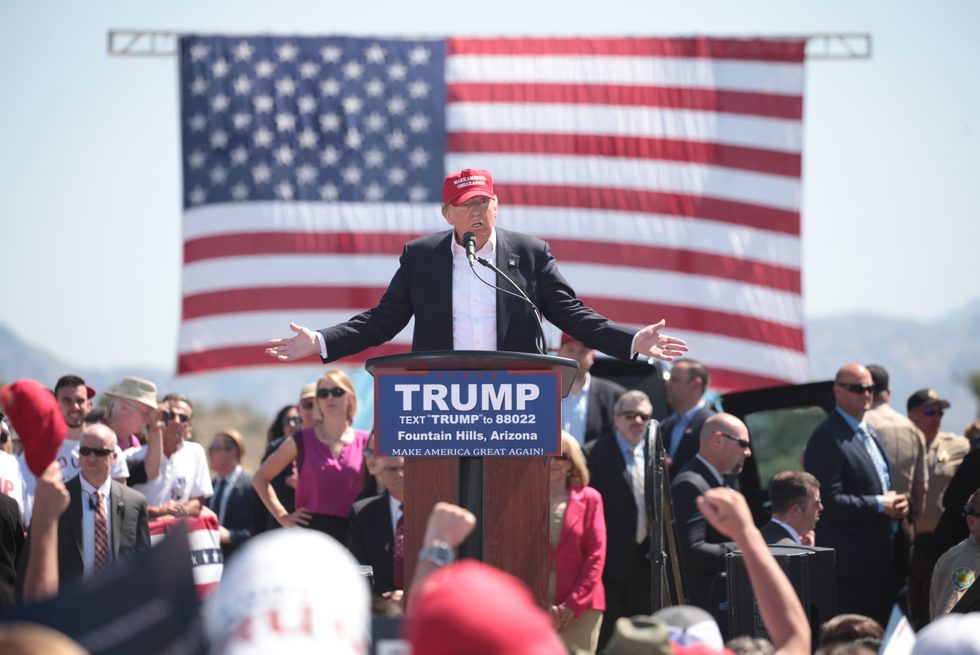Trump Studies
From the Series: The Rise of Trumpism
From the Series: The Rise of Trumpism

Consumer confidence is rising, I am told. (False news?) The Dow Jones too. (Ditto?) What a time this is for learning about people, politics, and oneself! The questions soar: how can jobs can be created with globalization and technological change? Aren’t the jobs that are created largely slavery anyway? By the way, what is this obsession with work? What’s so great about work, after all? Let’s get with the crisis, which is a whole lot bigger than Donald Trump, and start asking basic questions, while noting that police in America kill three people a day—a day!—largely African-American, and yet we need a British newspaper to keep the statistics as the government won’t. Is this not war?
It’s deep, this sickness. The young Marx called it alienation. My word for it is disembodiment, meaning bodies torn from themselves, from each other, and the body of the world.
Trumpism illuminates the necessary fiction of the social contract, and thus Trump Studies must too. Guy Debord’s spectacle now mesmerizes the entire world as unreality swamps the old real. The bland, boring predictability of president-lawyers like Obama and the Clintons now have little to offer voters hungry for red meat. The circus has come to town. False news becomes news just as news becomes false, as in any small peasant village adrift on rumor and witch hunts, only now the village is global and the medium is digital. An entirely new, language-busting cultural change is taking place beyond good and evil, wherein Trump Tower displaces the White House as the new normal, only there is no normal anymore. What sort of revolution, you ask? Not one of Rumsfeld’s known unknowns, but the unknown unknown, a stark instance of Elias Canetti’s crowds-and-power dictator, dependent on paranoia and death creating more of the same. Rule through Twitter abandons the pretense of rationality required by the magic of the state, in place of which we find that other magic bound up with manifestly performative performance. What insights, then, can anthropology, with its wealth of traditions, provide? Can Trump Studies match its object of study?
In this regard, Noam Chomsky draws my attention to one of those diabolical mixtures that make up our current dispensation: the metaphysical alienation of self and society in a vortex of consumerism and hate. Not just hate, but hate of vulnerable others for which the predominantly white working-class addiction to—and rising deaths and suicides from—opioids provides further allegories. Whatever happened to Ronald Reagan’s War on Drugs? No need for the jungles of South America or the Mexican connection. Now we have Big Pharma doling stuff out in truckloads to kill its own consumers legally. The American Dream. Manifest Destiny. Didn’t just happen overnight.
Try as they might, critics of the media’s lavish attention toward Trump were spitting in the wind. Here was a man all body, reminiscent of Mikhail Bahktin’s study of Rabelais, complete with the acclaim of the body’s lower generative zone, his whale-like proportions, and the bilge-water locker-room talk in the same public sphere that Jürgen Habermas hoped would preserve the rational.
Trump’s victory was Rabelaisian. His followers loved the fornicatory obscenity, no holds barred, even as he endorsed family values. Others were appalled, but entranced. Yet, for Bakhtin, the grotesque body, laughter, and sexual transgression in Rabelais offered hope of an alternative to the gulag, while with Trumpism the aim is to impose it, starting with Muslims. The appeal of Trumpism lies in its Bataillian excess, surging through race war, irreversible climate change, and the threat of nuclear war administered by billionaires and generals. Exciting!
Is this the endgame of capital, the ultimate gasp of neoliberalism subordinating society to the theater of the economy? Following Malinowski, Karl Polanyi pointed to the opposite: the embodiment of the economic in society. How might we achieve that, noting, thanks to Marshall Sahlins, that the hau of the gift lies in the forest?
In the forest we turn to what we know best, namely the riveting sense of life and lives instilled by fieldwork and the ecstatic craft of writerly practice.
What better, then, in this moment of crisis, than to undertake sweeping experimentation with forms and tones of exposition? Fight theater with theater, art with art, magic with magic. There is no other way. Trumpology will thus be an art form, not of mastery, but of the mastery of nonmastery.
It will be a practice unleashing the boundless curiosity that every young student feels upon engaging with anthropology, but that professionalism subverts though the forms and language of grantwriting, refereed journal articles, conferences, awards, and triple-A polish, alongside the mind-numbing virus of corporate mentality with a smiley face. Now it’s all agribusiness writing.
The practice I have in mind will be a nervously nervous nervous system, a slash-and-burn practice using the left hand (the hand that strikes the decisive blows in history). Robert Hertz acknowledged this to be the side of sorcery; it sets itself against the dominance of the right hand, ever in cahoots with the sun, speed, patriarchy, and the state. This practice will be an anthropology of the impending catastrophe that learns from anthropology no less than from history, so as to change both. What a time this is for learning about people, politics, and oneself!